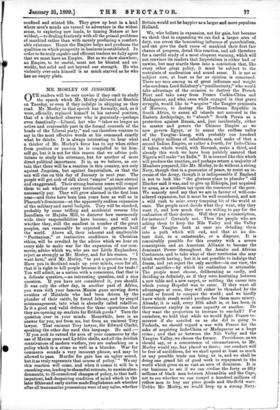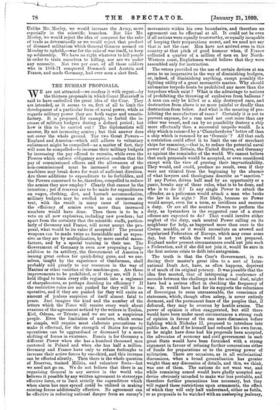MR. MORLEY ON JINGOISM.
OUR readers will be very unwise if they omit to study the speech which Mr. Morley delivered at Brechin on Tuesday, or even if they indulge in skipping as they read. Mr. Morley in that speech has formally, and, as it were, officially, replaced himself in his natural position, that of a detached observer who is genuinely—perhaps even fanatically—Liberal, but who " takes no longer an active and responsible part in the formal counsels of the heads of the Liberal party," and can therefore venture to say in the most effective words at his command exactly what he thinks. It is always interesting to hear what a thinker of Mr. Morley's force has to say when either from position or passion he is compelled to let him- self go, but it is not for this reason that we advise poli- ticians to study his utterance, but for another of more direct political importance. It is, as we believe, as cer- tain that there will be a reaction in this country, not only against Jingoism, but against Imperialism, as that the sun will rise on this day of January in next year. The people will get sick of talk about "empire" at once eternal and exaggerated. Their strong business sense will compel them to ask whether every territorial acquisition must necessarily pay. They will grow alarmed in the first lean year—and there have been lean years here as well as in Pharaoh's dominions—at the apparently endless expansion of the military and naval budgets. They will be shocked, probably by some trifling and accidental reverse like Isandlana or Majuba Hill, to discover how enormously wide their responsibilities have become, and will ask whether they, still the smallest in number of the great peoples, can reasonably be expected to garrison half the world. Above all, their inherent and unalterable " Puritanism," or instinctive confidence in Christian ethics, will be revolted by the advice which we hear on every side to make war for the expansion of our com- merce, advice which we, who are not Little Englanders, reject as strongly as Mr. Morley, and for his reason. " I want here," said Mr. Morley, " to put a question to you. Have you in Scotland made up your minds, once for all, that it is right to kill people because it is good for trade ? You will admit, as a nation with a conscience, that that is a delicate question,—an interesting question, and a nice question. If you have not considered it, you should. It was only the other day, in another part of Africa, you were with your famous Maxim guns mowing down swathes of Matabele who had been driven by the plunder of their cattle, by forced labour, and by stupid mismanagement, into what is absurdly called rebellion. Is it a good and valid defence for these operations that they are opening up markets for British goods ? Turn the question over in your minds. Meanwhile, here is an answer for you, not from me, but from an eminent Tory lawyer. That eminent Tory lawyer, Sir Edward Clarke, speaking the other day used this language. He said :- If you seek to extend the area of your commerce by the use of Maxim auns and Lyddite shells, and all the devilish contrivances of modern warfare, you are embarking on a policy which is a crime as well as a blunder. War for commerce sounds a very innocent phrase, and may be allowed to pass. Murder for gain has an uglier sound, but it as truly represents that course of policy.' " We say this reaction will come, and when it comes it will be a smashing one, leading to shameful retreats, to unwise aban- donments, to ill-considered changes of policy, to that half- impatient, half-despairing condition of mind which in the later fifties and early sixties madeEnglishmen ask whether after all transmarine possessions were of any value, whether Britain would not be happier as a larger and more populous Holland.
We, who believe in expansion, not for gain, but because we think that in expanding we can find a larger area of duty, can arrest the benumbing influence of parochialism, and can give the dark races of mankind their first fair chance of progress, dread this reaction, and ask therefore for a careful study of a most eloquent warning, which will not convince its readers that Imperialism is either bad or unwise, but may startle them into a conviction that, like every other great policy, it must be subject to the restraints of moderation and sound sense. It is not so subject now, at least as far as opinion is concerned. There are men among us of great influence and weight who condemn Lord Salisbury's "pusillanimity," who would take advantage of the occasion to destroy the French Fleet and take away from France Cochin-China and Madagascar, and who, even while engaged in that grave struggle, would like to " acquire " the Tangier peninsula of Morocco, to destroy the Herdsman Republic in South Africa, to annex all islands not annexed in the Eastern Archipelago, to "absorb" South Persia as a protection against Russia, and, just incidentally, either to master and govern the Chinese Empire as we now govern Egypt, or to annex the endless valley of the Yangtse- kiang, with probably one hundred and eighty millions of inhabitants, and make of that a second Indian Empire, or rather a fourth, for Indo-China if taken whole would, with Bunnah, make a third, and already this week we have been publicly assured that Nigeria will make "an India." It is counsel like this which will produce the reaction, and perhaps return a majority of Members prepared, like Mr. Morley, to do without a strong Navy, though that is a guarantee of peace, to resist an in- crease of the Army, though it is indispensable if England is not to look like " the glorious place to plunder " old Blucher said it was, and to give up Ethiopia, just acquired by arms, as a needless tax upon the resources of the poor. We scarcely need say that we are in favour of well-con- sidered expansion, but it must be well considered, and not a wild rush to seize every tempting bit of the world at once. The people must decide what they want•, why they want it, and how much they are willing to pay for the realisation of their desires. Will they pay a conscription, for instance ? Certainly not. Then the people who are asking them to keep the Nile Valley and the Valley of the Yangtse both at once are deluding them into a path which will end, and that at no dis- tant date, in a catastrophe, or a disgrace. It is conceivably possible for this country with a severe conscription and an American Alliance to become the dominant Power throughout the Asiatic and African Continents, and to take what of their territories she may think worth having ; but it is not possible to indulge that dream, and yet reject the only sacrifice—in our view, the awful sacrifice—by which its realisation is attainable. The people must choose, deliberating as coolly, and deciding as definitely, as if they were hesitating between a new table and a new carpet, or settling the career into which young Hopeful was to enter. If they want all advantages at once, they will either be thrashed by the world or forced to conquer the world ; and we hardly know which result would produce for them more misery. Already, it is said, every fifth adult is, or has been, in Government employ in some capacity or another. Do they want the proportion to increase to one-half ? For ourselves, we hold that while we would fight France to- morrow if she assailed us as she did in going to Fashoda, we should regard a war with France for the sake of acquiring Indo-China or Madagascar as a huge crime ; and that as between the Nile Valley and the Yangtse Valley, we choose the former. Providence, as we should say, or a concurrence of circumstances, as Mr. Morley would say, has placed us there ; our conduct will be free of sordidness, for we shall spend at least as much as any possible trade can bring us in, and we shall be doing one grand bit of good work in repayment to the world which gives us so vast an area of dominion. It is our business to see if we can civilise the forty or fifty millions of black men between Alexandria and the Cape, not to see whether we can compel a hundred millions of yellow men to buy our piece goods and Sheffield ware. Unlike Mr. Morley, we would keep up a strong Navy. Unlike Mr. Morley, we would increase the Army, more especially in the scientific branches. But like Mr. Morley, we would reject the idea of conquest for the sake of trade as determinedly as we would reject that product of diseased militarism which General Gatacre seemed on Monday to uphold,—war for the sake of war itself, to keep up soldiership. We have no right whatever to kill people in order to train ourselves to killing, nor are we under any necessity. Not two per cent. of all those soldiers who in 1864.71 conquered Denmark and Austria and France, and made Germany, had ever seen a shot fired.



































 Previous page
Previous page